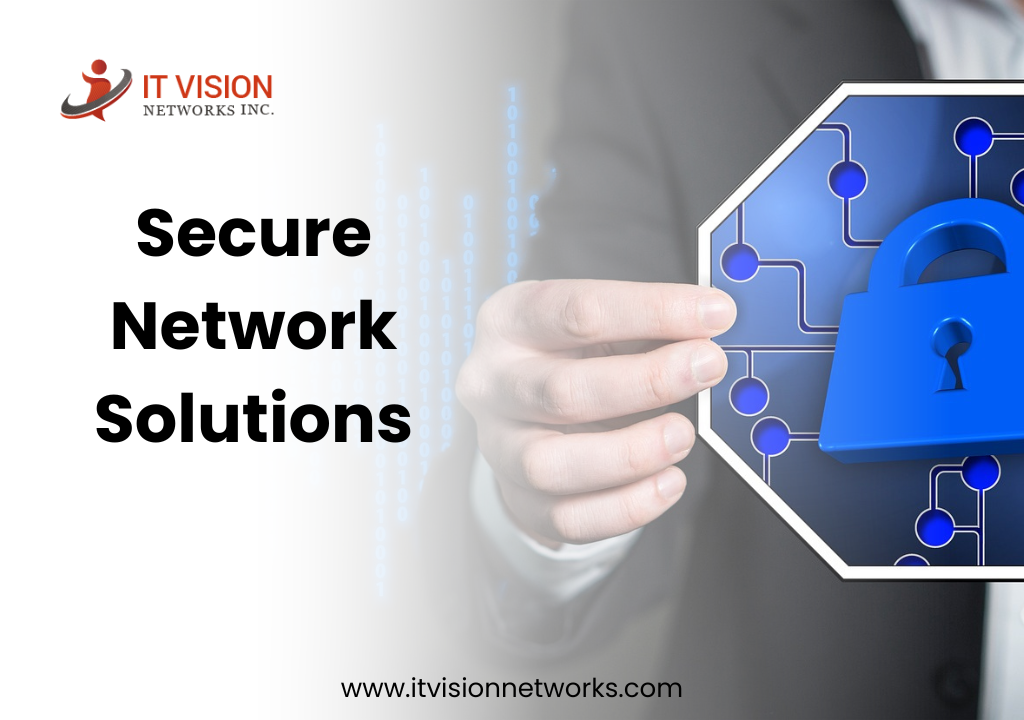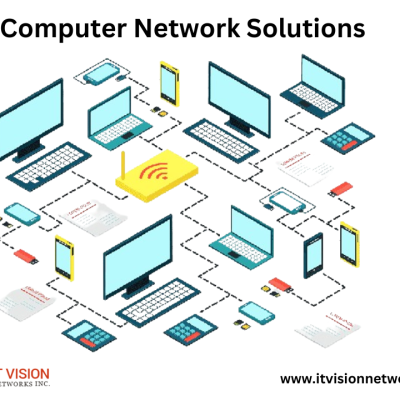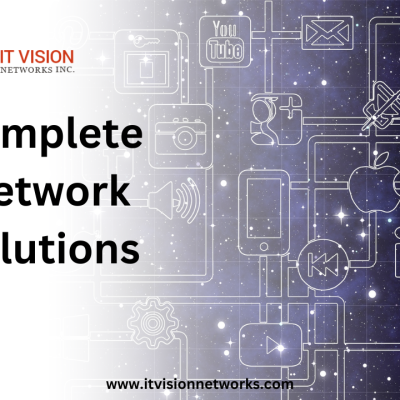In the modern day and age, when cyber troubles are becoming increasingly critical, protecting your network must be the beginning and end of the discussion. Secure network solutions and reliable network solutions protect your data, computer programs, and systems from viruses, malware, and cybercrime. This detailed analysis is meant to grasp secure network solutions properly and their meaning, aiming to ensure your business.
The Importance of Secure Network Solutions
Network security is a vital component of every organization’s IT architecture. It includes safeguards against unauthorized access, abuse, and interference with computer networks and their data. Secure network solutions maintain your data’s confidentiality, integrity, and availability, ensuring it remains safe and accessible only to authorized individuals.
Purchasing robust and secure network solutions helps prevent proprietary data, intellectual property, and sensitive consumer information from getting into the wrong hands. A network security breach may cause significant financial losses, harm one’s reputation, and have legal ramifications. Therefore, prioritizing secure network solutions is vital to protecting your business assets and maintaining the trust of your clients.
Common Threats to Network Security
Before delving into the different types of secure network solutions, it is essential to understand the common threats that can compromise your network’s security. Cybercriminals employ various tactics to exploit vulnerabilities and gain unauthorized access to your network. Some common threats include:
Malware
Ransomware, worms, trojans, and other malicious software threaten network security. These programs can infiltrate your network, disrupt operations, steal sensitive information, or hold your data hostage.
Phishing Attacks
Phishing attacks involve deceiving people into divulging private information, such as login passwords or bank account information. Cybercriminals often use deceptive emails, fake websites, or phone calls to gain unauthorized access.
Denial-of-Service (DoS) Attacks
DoS attacks aim to overwhelm a network or system with excessive traffic, rendering it inaccessible to legitimate users. This disrupts business operations and can cause significant financial losses.
Understanding these common threats highlights the importance of implementing robust, secure network solutions to mitigate the risk and protect your network from potential vulnerabilities.
Understanding Different Types of Secure Network Solutions
Secure network solutions encompass various technologies and strategies to safeguard your network from unauthorized access and potential threats. By thoroughly understanding these solutions, you can choose the best one for your company.
Firewalls
With the ability to monitor and regulate incoming and outgoing traffic, firewalls are a barrier between your internal network and outside sources. They examine data packets and use pre-established criteria to decide whether to grant or deny access, safeguarding your network from unauthorized access and malware.
Virtual Private Networks (VPNs)
VPNs establish secure connections over the internet, encrypting data transmission between remote users and your network. By creating a secure tunnel, VPNs ensure that data remains confidential and protected from interception, especially when accessing the network from unsecured or public networks.
Intrusion Detection and Prevention Systems (IDPS)
IDPS is designed to detect and respond to potential threats or attacks in real time, real-monitor network traffic, analyze patterns, raise alarms, or take preventive measures to stop attacks from compromising your network’s security.
Choosing the Right Secure Network Solution for Your Business
With many secure network solutions, selecting the right one for your business can be overwhelming. Consider the following factors when choosing a secure network solution:
Business Needs
Evaluate your company’s unique needs, considering the extent of your network, the sensitivity of your data, and the degree of remote access needed.
Scalability
Ensure the secure network solution can accommodate your business’s future growth and evolving security needs. It should be scalable and adaptable to changing circumstances.
Compatibility
Evaluate the secure network solution’s compatibility with your IT infrastructure and software applications. Seamless integration reduces implementation complexities and ensures maximum effectiveness.
By carefully evaluating these factors, you can identify the secure network solution that aligns with your business objectives and provides your network with the highest level of protection.
Implementing Secure Network Solutions
Implementing secure network solutions involves steps to ensure a smooth transition and optimal security. Follow these best practices to implement secure network solutions effectively:
Risk Assessment
Perform a comprehensive risk assessment to find weaknesses and possible dangers unique to your network. This will assist in creating a plan for network security that works.
Network Segmentation
Divide your network into separate segments with security controls and access privileges. This minimizes the potential impact of a security breach by containing the threat within a specific segment.
Regular Updates and Patching
Utilise patches and updates often to keep your secure network solutions current. This lowers the possibility of exploitation by guaranteeing that known vulnerabilities are fixed.
By following these best practices during the implementation phase, you can establish a secure network environment that effectively protects your data and mitigates potential threats.
Benefits of Investing in Secure Network Solutions
Investing in secure network solutions offers numerous benefits for your organization. These benefits extend beyond mere protection against cyber threats and include:
Enhanced Productivity
Secure network solutions provide a stable and reliable environment, minimizing downtime due to security breaches or network disruptions. This enhances overall productivity and ensures uninterrupted business operations.
Regulatory Compliance
Many industries have specific regulations and compliance standards regarding data security. Investing in secure network solutions ensures your organization meets these requirements and avoids potential legal repercussions.
Customer Trust
When you commit to network security, customers are more likely to trust and believe in your company. They are also more inclined to deal with businesses prioritizing the protection of their personal information.
By investing in secure network solutions, you can protect your network from potential threats and gain a competitive advantage by establishing a safe and trustworthy reputation.
Network Security Solutions for Small Businesses
When it comes to network security, small enterprises frequently confront particular difficulties. Robust and secure network solutions must be implemented with more funding and fewer resources. Nonetheless, there are several affordable choices available:
Unified Threat Management (UTM)
UTM solutions combine security features such as firewall, antivirus, intrusion detection, and virtual private networking into a single integrated platform. This provides small businesses comprehensive protection against various threats while minimizing costs and complexity.
Cloud-Based Security Solutions
Cloud-based security solutions offer small businesses scalable and affordable network security options. These solutions eliminate the need for substantial on-premises infrastructure by utilizing cloud computing to deliver firewall, antivirus, and web filtering—all crucial network security functions.
Employee Training and Awareness
Small businesses must educate employees about network security and standard security practices. Promoting a culture of security awareness can significantly decrease the likelihood of security breaches caused by carelessness or human mistakes.
Implementing these network security solutions, tailored to small businesses’ unique needs, ensures robust protection while keeping costs manageable.
Network Security Solutions for Large Enterprises
Large enterprises face complex network security challenges due to their size, distributed network architecture, and diverse user base. Implementing secure network solutions at an enterprise level requires a comprehensive approach:
Next-Generation Firewalls (NGFW)
NGFWs provide advanced threat detection and prevention capabilities, combining traditional firewall functionality with additional security features such as intrusion prevention, deep packet inspection, and application control. These capabilities enable large enterprises to protect their networks against sophisticated attacks effectively.
Security Information and Event Management (SIEM)
SIEM solutions collect and analyze log data from various network devices, applications, and security systems. By correlating this data and detecting anomalies, SIEM solutions enable large enterprises to identify potential security incidents in real time and respond promptly.
Security Operations Center (SOC)
Establishing a dedicated SOC allows large enterprises to centralize their network security operations. A SOC provides round-the-clock monitoring, incident response, and threat intelligence services, ensuring comprehensive protection against potential threats.
These enterprise-level secure network solutions can help large organizations address their unique challenges and safeguard their extensive networks.
Network Security Solutions for Remote Work
With the increasing trend of remote work, ensuring the security of remote connections has become crucial. Secure network solutions specifically designed for remote work include:
Secure Remote Access
Secure remote access solutions, such as VPNs, enable remote workers to connect securely to the organization’s network. These solutions authenticate users, encrypt data transmission, and apply security policies, ensuring that remote connections are secure and protected from potential threats.
Multi-Factor Authentication (MFA)
By putting MFA into practice, remote access is further secured. Through several authentication factors, including tokens, passwords, and biometrics, multi-factor authentication (MFA) considerably lowers the possibility of unauthorized network access.
Endpoint Security
Endpoint security solutions protect remote devices like laptops and smartphones from malware and other threats. These solutions include antivirus software, firewalls, and encryption, ensuring remote devices comply with organizational security policies.
With these secure network solutions for remote work, organizations can facilitate secure remote access while maintaining the integrity and confidentiality of their network.
Network Security Solutions for Cloud Computing
Cloud computing offers numerous benefits, including scalability, flexibility, and cost-efficiency. However, it also introduces unique network security challenges. Secure network solutions tailored for cloud computing include:
Cloud Access Security Brokers (CASBs)
CASBs make control and visibility over data and apps housed in cloud environments possible. These solutions enforce security policies, monitor user activity, and detect and respond to potential threats within the cloud-based infrastructure.
Encryption and Data Protection
Implementing encryption and data protection mechanisms ensures that sensitive data remains secure in transit and at rest within the cloud environment. Encryption safeguards data from unauthorized access, even if it falls into the wrong hands.
Cloud Security Auditing and Compliance
Regularly auditing and assessing the security of your cloud environment is crucial. Cloud security auditing solutions identify vulnerabilities, ensure compliance with industry standards, and provide recommendations for remediation.
By adopting these secure network solutions for cloud computing, organizations can embrace the benefits of cloud technology while maintaining a robust security posture.
Future Trends in Secure Network Solutions
Secure network solutions continually evolve to keep up with emerging threats and technological advancements. Some future trends in secure network solutions include:
Artificial Intelligence (AI) and Machine Learning (ML)
AI and ML technologies are increasingly used to enhance network security. These technologies make massive data analysis, anomaly detection, and real-time threat response possible, significantly increasing the efficacy of secure network solutions.
Zero Trust Architecture
Zero Trust Architecture adopts a “never trust, always verify” approach to network security. It treats every user, device, and network segment as potentially untrusted and requires continuous verification and authentication before granting access to network resources.
Software-defined networking (SDN)
SDN decouples the network control and data forwarding, allowing for more granular control and centralized management of network security policies. This enhances network security, scalability, and flexibility, particularly in large enterprise environments.
These future trends in secure network solutions are poised to revolutionize the field of network security, ensuring organizations stay one step ahead of potential threats.
Conclusion
Cyber threats are ever-present in today’s digital landscape, and securing your network is paramount. This tutorial has given you a thorough grasp of secure network solutions and their importance for safeguarding your company. By implementing the right secure network solutions, organizations can mitigate potential threats, protect sensitive information, and maintain the trust of their clients. Stay vigilant, adapt to emerging trends, and prioritize network security to unlock the power of secure network solutions.
FAQs
Secure network solutions encompass technologies and strategies for protecting computer networks from unauthorized access, misuse, or disruption. They also ensure data confidentiality, integrity, and availability within the network.
Firewalls, intrusion detection systems, and encryption are security features that secure network solutions offer to stop unwanted access, identify possible threats, and protect data transit.
Investing in secure network solutions enhances productivity, ensures regulatory compliance, and instills customer trust. It protects sensitive data, mitigates financial losses, and helps maintain a safe reputation.
Small businesses can enhance network security by opting for cost-effective solutions such as Unified Threat Management (UTM), cloud-based security solutions, and employee training.
To handle complicated network security issues, large businesses might set up a Security Operations Center (SOC) and deploy Next-Generation Firewalls (NGFW) and Security Information and Event Management (SIEM) systems.
Secure remote access, multi-factor authentication, and endpoint security solutions are crucial for securing remote connections and protecting data transmitted between remote workers and the organization’s network.
Secure network solutions for cloud computing include Cloud Access Security Brokers (CASBs), encryption and data protection mechanisms, and regular cloud security auditing and compliance assessments.
Artificial Intelligence (AI) and Machine Learning (ML), Zero Trust Architecture, and Software-Defined Networking (SDN) are some future trends that will shape the field of secure network solutions.






